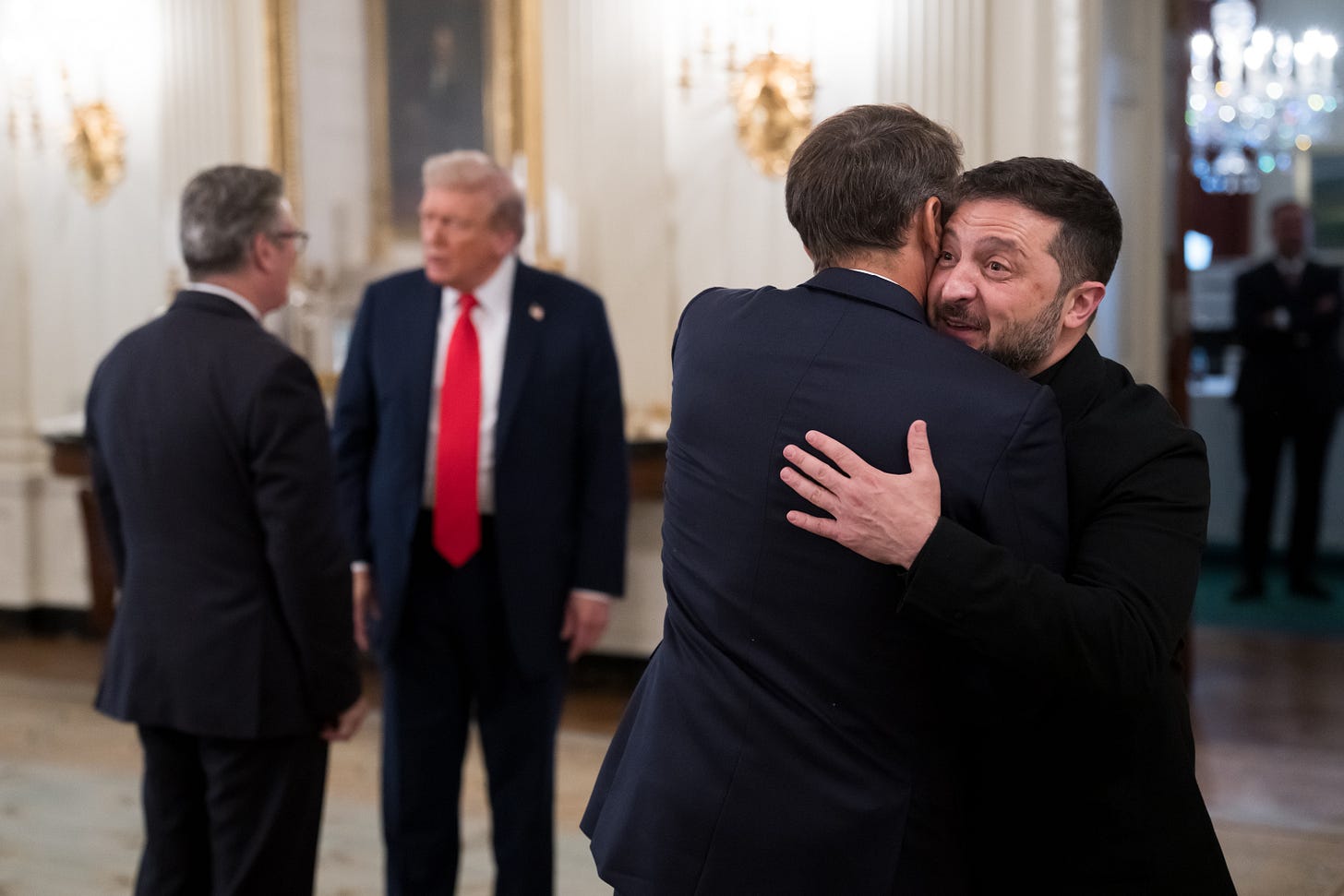Trump Allies Make their Move Against Zelenskyy
As Ukraine fights for survival against Russia’s invasion, Trump’s allies are quietly working to weaken its president.

By Brian Daitzman
Fact Box
Valerii Zaluzhnyi is Ukraine’s ambassador to the U.K. and former army chief.
J.D. Vance attempted to reach Zaluzhnyi after Trump’s Oval Office clash with Zelenskyy.
Trump allies met secretly with Tymoshenko and Poroshenko to discuss early elections.
Ukraine’s constitution bans elections under martial law.
Polls show Zaluzhnyi as Zelenskyy’s strongest rival for the presidency.
Undermining Zelenskyy risks weakening Ukraine’s negotiating power and security.
Ukraine is fighting for its survival against Russia’s invasion — a war in which defeat would mean not just territorial loss but potential state annihilation.
Yet at this moment of maximum danger, the country’s wartime leadership is facing destabilization not only from Moscow but also from Washington.
Allies of Donald Trump, fresh from a bruising Oval Office confrontation with Volodymyr Zelenskyy, are reported to be probing Ukraine’s opposition, floating alternatives to the elected president, and even attempting to court Valerii Zaluzhnyi, the revered general turned ambassador in London.
This political maneuvering strikes at the heart of wartime governance.
By questioning Zelenskyy’s legitimacy and encouraging succession speculation, Trump’s circle weakens Ukraine’s ability to cut a deal to end the war, emboldens Russia to stall for regime change, and raises the risk that Zelenskyy himself could be targeted in a climate where political delegitimization can translate into violence.
Why it matters: Undermining a democratic ally in wartime makes victory less likely and defeat more dangerous.
The Call Zaluzhnyi Refused
In March, just days after the humiliating clash between Trump and Zelenskyy in the Oval Office, Vice President JD Vance’s team placed calls to the Ukrainian embassy in London.
They sought to speak with Zaluzhnyi, the former commander-in-chief who had become Ukraine’s ambassador to Britain after being dismissed in early 2024.
According to The Guardian, Zaluzhnyi refused to take the call, after consultation with Zelenskyy’s chief of staff.
It was a moment that captured his balancing act: outwardly loyal to the government he served, inwardly aware that he is seen as Ukraine’s natural alternative leader.
The White House described the outreach as “standard diplomatic contact.”
But in Kyiv, the attempted call resonated differently: as an attempt by Trump’s circle to test whether the war hero might break ranks. Zaluzhnyi’s refusal was thus more than a courtesy; it was an act of political discipline, a signal that he would not be the vehicle for undermining the president during wartime.
LIVE from Ukraine: Tim Mak on the Trump-Putin Summit Fiasco
"Where to start with this fiasco? The kind of large-scale reaction from here in Kiev is one of absolute disgust,” Tim Mak told Lincoln Square Executive Editor Susan J. Demas in a Saturday morning interview from Ukraine.
Trump Allies Court Tymoshenko and Poroshenko
If Zaluzhnyi would not be drawn in, others proved more willing. According to Politico Europe, senior Trump allies held secret discussions with former prime minister Yulia Tymoshenko and figures from Petro Poroshenko’s party.
The talks centered on the possibility of holding early elections in Ukraine — a constitutional impossibility under martial law, but one that Russia has long pressed for in order to destabilize Kyiv from within. Trump’s circle reportedly argued that Zelenskyy would lose such a vote due to war fatigue and frustration with corruption.
These meetings went well beyond ordinary diplomacy.
They represented an American political faction aligning with Ukrainian opposition parties in ways that mirror Kremlin objectives.
Even as U.S. officials denied interference, Trump accused Zelenskyy of being a “dictator without elections” and suggested he “would not be around very long” if he refused to cut a deal with Moscow.
Such rhetoric erodes Zelenskyy’s legitimacy, undermines his leverage in any peace negotiations, and increases the danger that Ukraine’s president could become the target of violence in a country at war.
The General Abroad
For Zaluzhnyi, London has been both a refuge and a stage. As ambassador, he posts photographs of theater outings with his wife, and poses with King Charles at Buckingham Palace.
Yet he remains a figure of magnetic political interest, with MPs, business elites, and even discredited foreign consultants seeking his ear.
His refusal of Vance’s call was consistent with his pledge to Zelenskyy’s chief of staff: he would not surprise the president or undermine him during the war.
But polling shows Zaluzhnyi as Zelenskyy’s strongest potential rival, the only figure capable of unseating him in a future election.
The general has mused privately about a Churchillian platform — “blood, sweat and tears” for the nation’s survival — and cites Israel as a model for a permanently mobilized security state.
His silence is tactical.
By waiting, he avoids becoming a tool of Trump’s maneuvers or Moscow’s designs. Yet his very presence casts a shadow over Ukraine’s political future, raising expectations of an eventual showdown.
Historical Echoes
The U.S. pressuring a wartime ally’s leadership is not without precedent.
During the Cold War, Washington covertly backed favored parties in Italy’s 1948 elections, ensuring the defeat of the Communist Party through financing and propaganda.
In Greece, American support for conservative forces contributed to deep political instability and helped pave the way for the 1967 military coup. In both cases, the justification was strategic — to secure NATO’s flank. But the consequence was to corrode democratic processes in fragile states.
Ukraine today faces something more existential. Unlike postwar Italy or Greece, it is not simply debating ideology — it is fighting for survival against an invader committed to its destruction.
To destabilize Kyiv’s leadership now is to risk outright collapse. Zelenskyy’s legitimacy, forged in the crucible of February 2022 when he refused to flee as Russian tanks advanced, is foundational to Ukraine’s ability to resist.
To undercut him in the middle of war is to replay history’s darker chapters, where dissatisfaction with an ally’s leader led great powers to tolerate or even encourage their removal.
The danger here is not metaphorical.
Wartime politics is volatile, and delegitimizing Zelenskyy could make him more vulnerable not only to electoral defeat, but to assassination or forced removal.
History shows that when external actors signal impatience with a democratic leader at war, destabilization often follows.
Why It Matters
The consequences of Trump’s allies meddling in Ukrainian politics are severe.
First, it fractures NATO unity, signaling to Moscow that Washington may not back Kyiv’s elected leader. Second, it undermines Zelenskyy’s ability to negotiate a peace deal, since any agreement he signs will be questioned as the product of a leader marked for replacement. Third, it risks Zelenskyy’s physical security: in wartime, casting a president as illegitimate creates a permissive environment for violence.
Ukraine is not a distant proxy but a democratic ally fighting a war of survival. Undermining its leadership in the middle of battle is not only reckless — it makes the outcome of the war less certain, increases the chances of Russian victory, and places Ukraine’s president in mortal danger.
Chronology
2021: Zaluzhnyi appointed commander-in-chief of Ukraine’s armed forces.
2022: Russia launches full-scale invasion of Ukraine.
Feb 2024: Zelenskyy dismisses Zaluzhnyi, appoints him ambassador to the UK.
Feb 2025: Trump berates Zelenskyy in Oval Office clash.
Mar 2025: JD Vance’s office attempts to reach Zaluzhnyi; he refuses the call.
Aug 2025: Politico reveals Trump allies met Tymoshenko and Poroshenko.
A Very Dangerous Game
Ukraine’s survival depends on unity, legitimacy, and international support.
By undermining Zelenskyy at the height of war, Trump and his allies are not merely playing politics — they are destabilizing a democratic partner under existential attack.
The echoes of Cold War meddling in Italy and Greece are unmistakable, but today the stakes are higher: Ukraine risks not only political instability but total defeat.
Valerii Zaluzhnyi’s silence in London is, for now, an act of discipline.
Yet the more Washington questions Zelenskyy’s authority, the more dangerous Ukraine’s wartime politics becomes.
The risk is not just electoral instability — it is that a president leading his nation through annihilation could be weakened to the point of removal, by ballot, by coup, or by bullet.
Sources
The Guardian, Shaun Walker, Aug. 25, 2025. https://www.theguardian.com/world/ng-interactive/2025/aug/25/general-envoy-future-ukraine-president-valerii-zaluzhnyi-london-waiting-game
Politico Europe, Jamie Dettmer, Mar. 6, 2025. https://www.politico.eu/article/donald-trump-allies-secret-talks-volodymyr-zelenskyy-opposition-ukraine-elections-yulia-tymoshenko-petro-poroshenko/
Brian Daitzman is the Editor of The Intellectualist. Read the original article here.








Trump and the people around him are not only traitors to the US, but also to our allies. They should suffer the appropriate penalties.
This betrayal is a great 21st century tragedy.